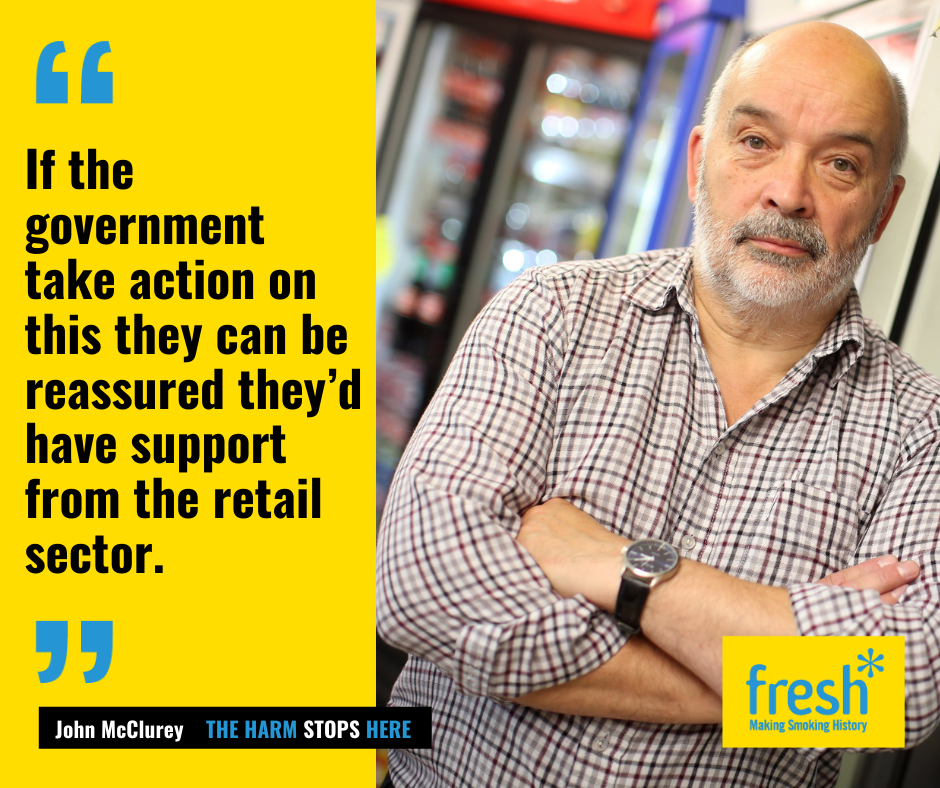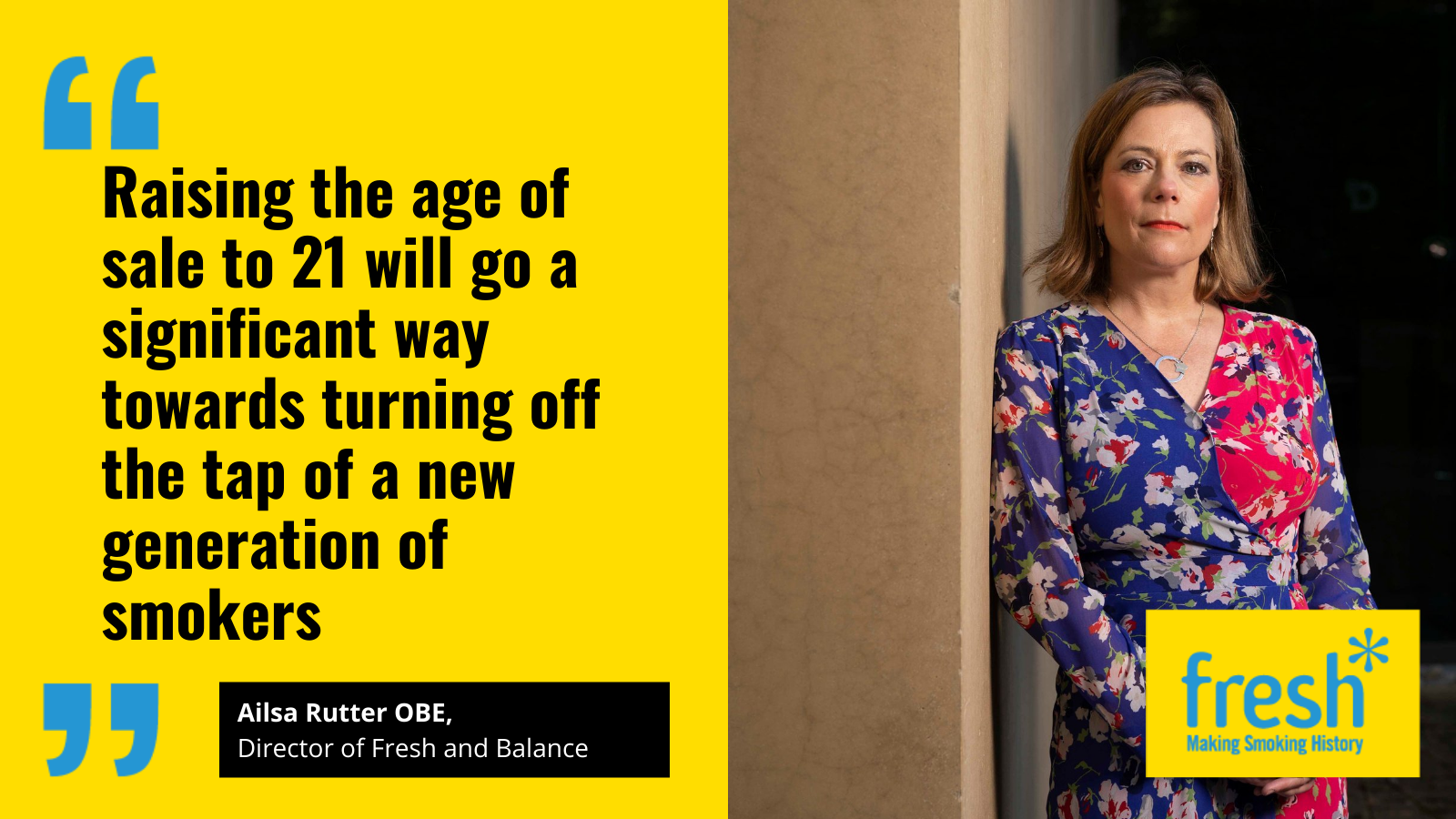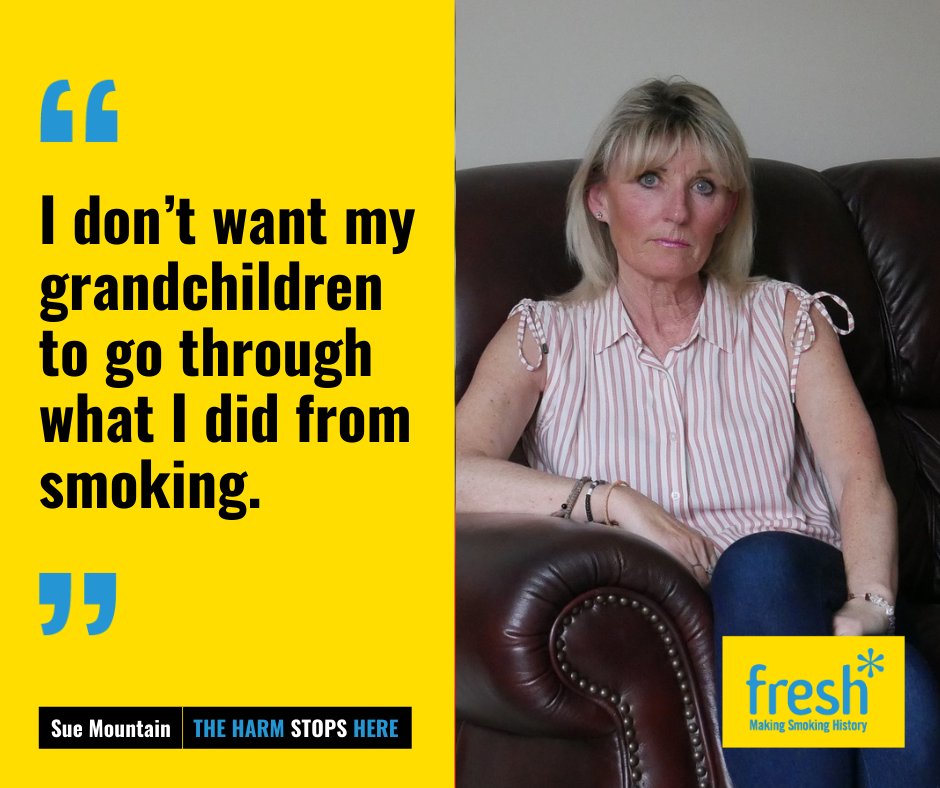Retailer joins two thirds of adults who support raising tobacco age of sale to 21
NEARLY two thirds of adults would support raising the age of sale for tobacco from 18-21. And over half of retailers would support the move including a shopkeeper whose own father died from smoking.
Shop owner and councillor John McClurey watched his dad die from a smoking related disease and has said that the move is needed urgently to prevent young people from taking up a deadly addiction. His voice has been echoed by Sue Mountain, a former smoker and cancer survivor.

Fresh, the North East’s tobacco control programme, says the Government needs to take action now – the number of 18-34 year olds who smoke increased by 25% in England during the first Covid lockdown. Research shows that a change to the law could result in a 30% drop in smoking rates among 18 to 20 year olds in the first year – representing 109,000 fewer smokers.
The call comes in the same week that the measure will be debated in Parliament along with a range of other recommendations from the All Party Parliamentary Group on Smoking or Health report on delivering a smokefree 2030 in England. An amendment has been tabled to the Health and Care Bill, led by City of Durham MP Mary Kelly Foy, to include a commitment to hold a consultation on age of sale within three months of becoming an Act.
There is strong support from the public and from retailers to increase the age of sale and to do more the stop the tobacco industry from inflicting more suffering on society:
- 63% of the public, and over half of retailers, support raising the age of sale for tobacco from 18 to 21
- 74% of the public support England becoming smokefree by 2030 with just 7% opposing
- 80% of the public support activities to limit smoking or think the government could do more with only 5% thinking the Government is doing too much (3%) or far too much (2%)
Ailsa Rutter OBE, Director of Fresh and Balance said: “So many of us have lost loved ones to smoking and many more are struggling to cope with the burden of living with, or looking after someone who has a tobacco-related disease. We need a new measures to cut smoking without delay and this is no more difficult to enforce than the law currently.

“We can’t go on treating tobacco as a normal commodity – it kills people and the tobacco industry have known this for decades, yet they continue to recruit young people to replace their customers who either quit or have died as a result of their addiction.
“Raising the age of sale to 21 will go a significant way towards turning off the tap of a new generation of smokers and would be no more difficult to enforce that the law now. The Government has said it is serious about its Smokefree 2030 ambition and they should be more confident from seeing such strong support. Nobody at the end of the day wants their own child to become a lifelong smoker.”
Shop owner John McClurey said: “The fact is that tobacco is a deadly product and no one wants their children to start smoking. The longer we can delay young people being able to buy tobacco the less chance they’ll have of becoming smokers.
“As surveys have shown, many retailers across the area – myself included – back the measure: we’d much rather have healthy customers with more money in their pockets to spend than see young people hooked into a lethal addiction and all the misery that brings.”
“Shops are adapting over time to tobacco being less a part of their business. If the government take action on this they can be reassured they’d have support from the retail sector.”
Ex-smoker and cancer survivor Sue Mountain, from South Tyneside underwent laser treatment in 2012 after a biopsy revealed she had laryngeal cancer. The cancer returned in 2017 which required radiotherapy every day for four weeks. Sue said: “I know the heartbreak that smoking can cause. I started when I was a kid, before I realised how addictive it was. I don’t want my grandchildren to go through what I went through. I think my view will be shared by many people who have smoked – it makes you even more concerned your loved ones don’t follow. I could have bought half a house with the money I spent on smoking instead of cancer.

“Raising the age of sale to 21 might not stop everyone under that age smoking, but it will stop many and save a lot of lives. Nobody who starts smoking young ever thinks they’ll smoke for life. You think you’ll have stopped before you get to the point where you can’t walk up the stairs anymore, or get told you have cancer. But tobacco is so addictive – once tobacco companies have you hooked, the addiction takes over.
Sue said: “The Government now has a real opportunity to end the harm caused by tobacco once and for all, to help more smokers to quit and prevent more young people from starting in the first place. This could really give more young people in places like the North East a much better quality of life, with better health and more money in their pocket rather than it going up in smoke.”
Tobacco is the only legal consumer product which kills when used as intended, causing the deaths of 200 people in the England every day. Chief Medical Officer, Professor Chris Whitty, pointed out recently that big tobacco is an industry that kills people for profit, and more people are likely to have died last year and this year from smoking than COVID-19.
Fresh has also urged Ministers to ignore the tobacco industry arguing against measures to cut smoking as being based purely on profit over health, with one leading manufacturer saying that raising the legal minimum age for cigarette purchaser to 21 could ‘gut our key young adult market.’ Chief Medical Officer Professor Chris Whitty has stated that tobacco is an industry that kills people for profit, and more people are likely to have died in 2020 and 2021 from smoking than COVID-19.
In 2019, the Government stated its ambition to make England smokefree 2030. Holding a consultation on increasing the age of sale for tobacco products – with engagement from adolescents and young adults under 21 – is a key recommendation in a report from a cross-party group of politicians setting out what the Government needs to do in order to achieve the ambition.
Sue said: “I fully support the APPG report and urge the Government to accept its recommendations – we have a real opportunity to end the harm caused by tobacco once and for all.
“As a former smoker and cancer survivor, I have personal experience of the heartbreak that smoking can cause. I started smoking when I was a kid, before I realised how addictive it was. I don’t want my grandchildren to go through what I went through; I want them to grow up in a world where smoking is a thing of the past.
“I’m one of the lucky ones, fortunately I have been given the all-clear from cancer. Smoking makes life a misery for many thousands of people who suffer from debilitating diseases before it kills them. It’s shocking that tobacco companies are making massive profits from an addiction that robs people of their lives and their health. I believe they need to pay for the damage they do.”
Mary Foy MP (Durham City), vice chair of the APPG on Smoking and Health who is leading the back bench debate on tobacco on 10th June jointly with the Chairman Bob Blackman MP, said: “I’m an MP from the North East, the poorest region in the country where smoking rates have historically been high. That’s why, although we’ve made good progress in recent years, we still suffer disproportionately from disease, disability and death caused by smoking. The APPG report recommendations will sever the ‘iron chain’ linking smoking and disadvantage. They are essential if we are to build back fairer and level up communities like my own.”
Professor Eugene Milne, Director of Public Health, Newcastle City Council and lead for tobacco issues with the Association of Directors of Public Health North East forum said: “To reduce health inequalities across our communities, we need to do even more on tobacco. We have made good progress in the last two decades here in the region but the reality is that half the difference in life expectancy between the richest and poorest in society is due to smoking and for every smoker who dies another thirty are suffering serious-smoking related diseases.
The coronavirus pandemic has thrown a spotlight on the devastating impact of inequalities and achieving the Government’s Smokefree 2030 ambition is an essential step towards reducing inequalities and increasing healthy life years. I back the All Party Group recommendations and look forward to seeing a comprehensive fully funded new Tobacco Control Plan for England as soon as possible.”
John McClurey, Newcastle based newsagent, said: “I lost my dad to lung cancer when he was 66, so I know firsthand the pain smoking causes and the impact it has had on my family.
“As a retailer, I find it hard selling cigarettes to customers. I often say to people that I’d much rather sell birthday cards to celebrate years of life lived, than sympathy cards for people who have died prematurely of smoking-related causes.
“It is scandalous that tobacco companies make huge profits from an addiction which kills one in two smokers, causes serious illnesses, and drives people into poverty. I firmly support the APPG report findings and back the strong action needed to end smoking by 2030 and the countless lives it will save.”
Bob Blackman MP, Chairman of the APPG, said: “Our report sets out measures which will put us on track to achieve the government’s ambition to end smoking by 2030, but they can’t be delivered without funding. Tobacco manufacturers make extreme profits selling highly addictive, lethal products, while government coffers are bare because of COVID-19. The manufacturers have the money, they should be made to pay to make smoking obsolete.”
There is widespread North East public support for government action to reduce smoking further with low levels of opposition:
- More than three quarters (78%) of the North East public support the Government’s Smokefree 2030 ambition, with just 7% opposing.
- 75% support making tobacco manufacturers pay a levy to Government for measures to help smokers quit and prevent young people from taking up smoking, with just 5% opposing.
- 65% support increasing the age of sale from 18 to 21, with just 11% opposing.
Nationally these measures are supported by voters for all parties. More than three quarters of those surveyed who voted Conservative (76%), Labour (82%) or Liberal Democrat (87%) in the 2019 election support the idea of a levy on tobacco manufacturers.
The strongest support for raising the age of sale to 21 comes from those who voted Conservative in 2019, two thirds (66%) of whom support raising the age of sale to 21 compared with 63% of Labour voters and 64% of Liberal Democrat voters.
